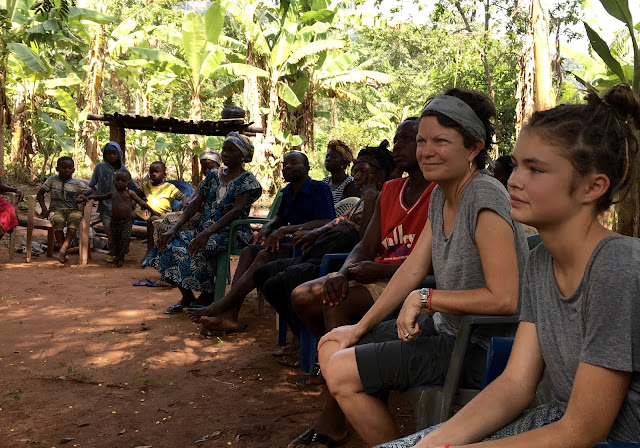We were greeted by a kind, older man who spoke English and would act as our translator. He gathered the villagers (all one extended family) and we sat around in a circle as part of a village meeting.
We asked them questions about life in their village. What would they change? What are their greatest struggles? They had plenty of answers. No water. Every day every member of the village walks a mile and a half to get water at a lake. During the dry season, the water is less available. The government has come once or twice, over several decades, to try to bore a hole, without success. (We later saw some of the collected water and I thought it was urine. Completely unclean.)
As can be imagined, the next biggest challenge is access to health care for the water-related problems, such as cholera, diarrhea, etc. Malaria is also an issue, since they all sleep outside on the ground (and malaria mosquitos come out at night). They use the leaves to heal cuts, but more serious illnesses require two villagers to run and hour and a half, with the sick person on a homemade stretcher, to the nearest clinic. By the time they take that measure, it is usually too late and the person dies.
Next, they simply don't have money. While they have a good farm growing cocoa and cassava, they have no way to get it to the nearest market, and no one will come buy it from them because of the horrible road conditions.
They were hoping we could solve all of those big problems, as well as a host of smaller ones, but we had to only assure them that we were looking for solutions that would help people like them. Hopefully some of the work Geoff will do will reach such people, maybe even this very village. That is the hope. But their difficult existence will continue for now.
We took a group picture.
As we broke up Geoff gave five to the kids and acted like it hurt his hand. They all laughed and laughed. It works every time, and never gets old.
Some teenage girls had been standing back, but when the group broke up they went straight to Adele and Ceci hoping for new friends.
The kids go to school, a priority of money for the village, but they have to walk an hour and a half each way. Parents take jobs working on farms or for shops in the nearest towns, some walking 5-6 hours EACH WAY every day. This particular day was a national holiday celebrating the end of colonization, so most people were home.
We got a tour of the village. Each family has their own little clearing in the trees, all connected by paths.
Goats are everywhere in Ghana. They eat them. These forage for their own food, but later in the day, in a larger town, we saw them all gathered at troughs. I'm not sure who owns and feeds them.
This cute pregnant woman showed me inside her home. It was dark and nearly empty. It acts as a storage place for personal belongings, like pots and pans, clothing, etc. There wasn't a single piece of furniture, and hardly anything else.
The families cook outside over a fire, and as I've mentioned, they sleep outside too.
These men were pounding fufu (boiled cassava). Since we know something about the strength required for such a task, I asked him to show me his muscles.
This older man was working even harder. He was beating palm beans to make palm oil. It was a full body workout. He was a human machine. In the background there is a large pot boiling with oil he has already made.
This kid totally posed for the picture! He made me laugh!
There were cocoa beans and cassava root drying on racks around the village.
This little girl is 7-years-old, carrying her baby sister. The baby cried and cried when she first saw us. The first white people she had ever seen, I'm sure. The little girl was covered in small, goose bump-looking bumps. I think this is from the water. Absolutely beautiful children.
In Ghana, holding hands, among all ages, is a gesture of friendship. It communicates you're a part of each other. These cute girls wanted to hold Adele's hands. I didn't see Ceci, but I'm sure she was holding hands with girls too.
This smiling woman was standing there like she was nonchalantly holding up her kitchen!
We departed with gifts of bananas, just cut from the tree, and lots of hugs and waves. What a memorable day!
As we traveled along we saw a couple groups of baboons on the side of the road!
Bob and Lynette Gay built a nursing school here, partnered with the University of Utah, to train medical personnel at a higher standard. It was a beautiful facility.
It was late by the time we neared home. We took Afasi out to our favorite restaurant and watched the World Cup game between Belgium and Japan. Did anyone see that?! I've never watched a World Cup game in my life, but we see most of them here and it is so fun. When out and about, the little wooden stands that sell TVs are crowded with people cheering on their favorite teams.
Afasi has so many interesting stories to tell, like sneaking across boarders buried under fish and buying back a little girl who had been kidnapped into sex slavery, for instance. Spending the day with him is full of interesting discussion!



















No comments:
Post a Comment